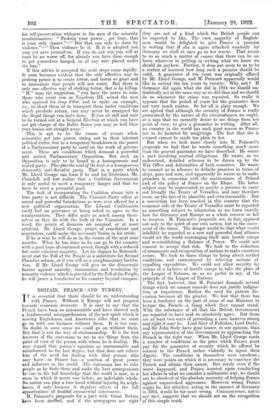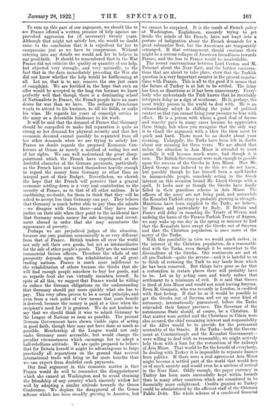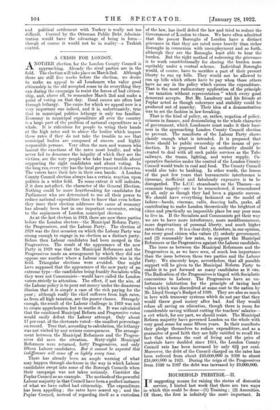BRITAIN, FRANCE—AND TURKEY.
IT is essential that there should be an understanding with France. Without it Europe will not progress towards economic recovery. It is easy to say that the French have been so unreasonable and have showed such a fundamental misapprehension of the new spirit which is moving Englishmen and Americans alike that we must go on with our business without them. It is' too easy. No doubt in some sense we could go on without them. But that is not the way of statesmanship. It is the first business of the statesman to try to see things from the point of view of the person with whom he is dealing. He may regard that person's opinions as unreasonable and misinformed to the last degree, but that does not relieve him of the need for dealing with that person, who may have—as France has—a position of great power and influence in the world. The statesman has to take people as he finds them and make the best arrangements he can in the full knowledge that the world is now, in a sense in which it never was before, an indivisible whole. No nation can play a lone hand without injuring its neigh- bours, if only because it deprives others of the full opportunities of fruitful commercial intercourse.
M. Poincare's proposals for a pact with Great Britain have been drafted, and if the newspapers are right they are not of a kind which the British people can be expected to like. The vast majority of English-, men would be delighted to give France a promise in writing that if she is again attacked wantonly by Germany we shall at once go to her rescue. That seems to us so much a matter of course that there can be no harm whatever in putting in writing what we know we should do anyhow. Further, it does not seem to us to be a matter of moment how long such a promise should be valid. A. guarantee of ten years was originally offered by Mr. Lloyd George, and M. Poincare apparently would like to extend -the ten years to twenty. Why not ? If Germany did again what she did. in 1914 we should un- doubtedly act in the same way as we did then and we should, do so . whenever the crime was repeated. So really it appears that the period of years for the guarantee does not very much matter. So far all is plain enough. We are agreed that although the security of France is really guaranteed by the nature of the circumstances we ought, as a sign that we earnestly desire to see things from. her point of view, to give a , guarantee in writing. After all, ' no country in the world has such good reason as France , has to be haunted by misgivings. The fact that she is secured cannot be made too plain to her. But when we look more closely into M. Poincare's proposals we find that he wants something much more than the general guarantee we have described. He wants a pact involving mutual obligations. He wants, as we understand, detailed schemes to be drawn up by the War Office and Admiralties of both countries. He wants, to commit us in advance to definite promises in terms of ships, guns and men, and apparently he wants us to make promises in connexion with the maintenance of Poland and of the policy of France on the Rhine. The latter subject may be represented as merely a promise to carry out literally the Treaty of Versailles, and may therefore seem, on the face of it, plausible and even reasonable. But a conviction has been reached in this country that the economic side of the Treaty of Versailles must be regarded as something subject to adaptation as we learn exactly. , how far -Germany and Europe as a whole recover or fail to recover. M. Poincare's proposals are, in fine, opposed • not only to the spirit of our own nation, but to the move- ment of the times. The danger would be that what would infallibly be regarded as a new and powerful dual alliance would set the world rearranging itself into hostile camps and re-establishing a Balance of Power. We could not consent to accept that risk. We look to the reduction, of armaments and co-operation of nations to make countries secure. We look to those things to bring about settled conditions and contentment by relieving nations of appalling expenditure. We could not allow security by means of a balance of hostile camps to take the place of the League of Nations, or, as we prefer to say, of the principle of the League of Nations. The fact, however, that M. Poincare demands several.
things• which we cannot concede does not justify indigna- tion or impatience. Rather the need for patient dis- cussion becomes all the greater. We fear that there has been a tendency on the part of some of our Ministers to lecture the French—a thing which they cannot stand. With the substance of all that the British Government are reported to have said we absolutely agree. But there . are at least two ways of presenting a case, however strong and right it may be. Lord Grey of Fallodon, Lord Derby, and Sir John Seely have gone nearer, in our opinion, than any representative of the Government to approaching the French in the right way. When Mr. Lloyd George made a number of conditions as the price which France must pay for the guarantee of security which he offered he seemed to the French rather violently to injure their dignity. The conditions in themselves were excellent ; they were points on which it is necessary to convince the French and obtain their assent. But surely even if the worst happened, and France insisted upon conducting , her affairs in what we consider a militaristic way, we should not be absolved of the absolute necessity of helping France against unprovoked aggression. However wrong France might be her attacker, acting in the manner of Germany in 1914, would be far more wrong. Common sense, not to say tact, suggests that we should act on the recognition of this simple truth. To sum up this part of our argument, we should like to see France offered a written promise of help against un- provoked aggression for (if necessary) twenty years. Although that might not satisfy her, she would no doubt come to the conclusion that it is expedient for her to compromise just as we have to compromise. Without entering into any details we would ask her to believe in our good faith. It should be remembered that in the War France did not criticize the quality or quantity of our help, but objected very strongly, and very naturally, to the fact that in the days immediately preceding the War she did not know whether the help would be forthcoming at all. Let us, that is to say, remove the one just cause of complaint. We are fortified'in the hope that such an offer would be accepted in the long run because we know perfectly well that though there is a dominating school of Nationalists in France, the French people have no more desire for war than we have. The ordinary Frenchman wants to attend to his business, to till his fields, or make his wine. He regards his years of conscript service in the army as a detestable hindrance to his work.
It will be said that the demand of France that Germany should be compelled to make full reparation is quite as strong as her demand for physical security and that her economic demand cannot possibly be separated from all her other demands when we are trying to satisfy her. France no doubt regards the proposed Economic Con- ference at Genoa as merely a method of voting her out of her rights. We can well understand the great disap- pointment which the French have experienced at the doubtful character of the German payments, particularly as the French have not taxed themselves heavily enough to regard the money from Germany as other than an integral part of their Budget. Nevertheless, we cherish the hope that the French will perceive that a general economic settling-down is a very real contribution to the security of France, as to that of all other nations. It is maddening, no doubt, for them to think that they will be asked to accept less than Germany can pay. They believe that Germany is much better able to pay than she admits —we disagree with them there—and they have some justice on their side when they point to the incidental fact that Germany sends money for safe keeping and invest- ment abroad in order that she may accentuate the appearance of poverty. Perhaps we are prejudiced judges of the situation, because our own position economically is so very different from that of France. British traders all over the world not only sell their own goods, but act as intermediaries for the sale of other people's goods. They are the universal commercial liaison officers. Therefore the whole of our prosperity depends upon the rehabilitation of all great trading nations. France is much more indifferent to the rehabilitation of others because she thinks that she will find enough people somehow to buy her goods, and as regards food she can virtually maintain herself. In spite of all this, we suggest that France would be willing to reduce the German obligations on the understanding that Germany should pay more quickly what she has to pay. This very often proves to be a sound principle, and even from a cash point of view means that more benefit is derived, because the money is paid at a time when the recipient's need for it is greatest. We do not hesitate to say that we should think it wise to admit Germany to the League of Nations as soon as possible. The present German Government have shown visible signs of acting in good faith, though they may not have done as much as possible. Membership of the League would not only make Germany more accessible, but would change the peculiar circumstances which encourage her to adopt a half-rebellious attitude. We are quite prepared to believe that for Britain herself it might be advantageous to forgo practically all reparations on the ground that revived international trade will bring us far more benefits than we can expect from doubtful cash payments. Our final argument in this economic matter is that France would do well to remember the disappointment which she caused at Washington and to avoid straining the friendship of any country which sincerely wishes her well by adopting a similar attitude towards the Genoa Conference. We deplore the disapproval of the Genoa scheme which has been steadily growing in America, but we cannot be surprised. It is the result of French policy at Washington. Englishmen, sincerely trying to get inside the minds of the French, have not leapt into a posture of indignation about the French demands for a great submarine fleet, but the Americans are temporarily estranged. If that estrangement should continue there might be a serious collapse of American friendliness towards France, and the loss to France would be incalculable.
The recent conversations between Lord Curzon and M. Poineare about the Near East, and the further conversa- tions that are about to take place, show that the Turkish question is a very important counter in the present negotia- tions with France. This is all to the good if it means that the future of Turkey is at last to be settled. The delay has been as disastrous as it has been unnecessary. Every- body who understands the Turk knows that he invariably interprets delay as a sign of weakness. He is, perhaps, the most tricky person in the world to deal with. He is an extraordinary adept in shifting the point of political contact so that you cannot bring your pressure to bear with effect. He is a person with whom a good deal of finesse and suavity pays in many cases because he appreciates these things, but when you recognize that the only way is to clinch the argument with a blow the blow must be quick and hard. There must be no doubt about your meaning. Unhappily, the Turks have been left in doubt about our meaning for three years. We are afraid that unless the situation in Asia Minor is attended to most carefully it will become much worse, bad though it is now. The British Government were rash enough to gamble upon the success of the Greeks in Asia Minor. How Mr. Lloyd George was induced to do this we do not know, but possibly though he has himself been a spell-binder to innumerable people, somebody acting in the Greek interest on this occasion bound Mr. Lloyd George with a spell. It looks now as though the Greeks have finally failed in their grandiose scheme in Asia Minor. The officers of the army are not being paid, and meanwhile the Kemalist Turkish army is probably growing in strength. Munitions have been supplied to the Turks, we believe, by France and particularly by Italy. If Britain and France still delay in recasting the • Treaty of Sevres, and undoing the harm of the Franco-Turkish Treaty of Angora, we may wake up one day in the spring or summer to find that the Kemalists have swept the Greeks out of Smyrna and that the Christian population is once more at the mercy of the Turks. With this possibility in view we would much rather, in the interest of the Christian population, do a reasonable deal with the Turks, even though it be somewhat to the discomfiture of the Greeks. Our sentiments are not at all pro-Turkish—quite the reverse—and it is hateful to us to think of restoring the Turk to any lands from which _he has been removed. But things have gone so far that a restoration in certain places there will probably have to be. Let us by acting soon and wisely reduce that settlement to a minimum of 'evil. It is said that Greece is tired of Asia Minor and would not mind leaving Smyrna. Even M. Gounaris, who was recently in London, is credited with that feeling. If that be so it would be possible to get the Greeks out of Smyrna and set up some kind of autonomy, internationally guaranteed, before the Turks reinvaded their former province. The- Governor of the autonomous State should, of course, be a Christian. If that matter were settled and the Christians in Cilicia were also secured, the chief remaining interest and responsibility of the Allies would be to provide for the permanent neutrality of the Straits. If the Turks—both the Govern- ment at Constantinople and the Kemalist Government— were willing to deal with us reasonably, we might actively help them with a loan for the restoration of the railways of Asia Minor. That would be for the benefit of everybody. In dealing with Turkey it is impossible to separate finance from politics. If there were a real agreement Asia Minor might become a settled part of the world that would free us of much anxiety and would even be a nucleus of revival in the Near East. Oddly enough, the paper currency in Turkey has been more successfully kept within bounds than in many other countries which are considered to be financially more enlightened. Credits granted to Turkey could be administered by the efficient staff of the Ottoman Public Debt. The whole scheme of a combined financial and political settlement with Turkey is really not too difficult. Control by the Ottoman Public Debt Adminis- tration would have the advantage of being in form— though of course it would not be in reality—a Turkish control.




































 Previous page
Previous page